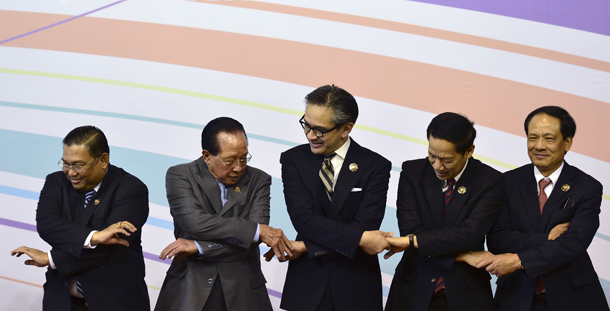BANDAR SERI BEGAWAN, Brunei — Southeast Asian diplomats have not abandoned hope that this week’s annual Asian security summit will provide a chance for North Korea and its neighbors to discuss restarting long-dormant disarmament talks on Pyongyang’s nuclear weapons program, according to a joint statement released Sunday.
The top diplomats from North Korea and the five other nations involved in the now-stalled nuclear disarmament talks are gathering in Brunei for the Association of Southeast Asian Nations (Asean) Regional Forum. The international standoff over North Korea’s pursuit of nuclear weapons is expected to take center stage, along with other regional issues, including South China Sea territorial disputes.
In the last six months, North Korea has launched a long-range rocket and conducted an atomic test in defiance of UN Security Council resolutions banning the regime from nuclear and missile activity. Pyongyang calls the weapons buildup the core of its defense against US aggression, and has vowed to push ahead in constructing the arsenal as long as it feels threatened by the United States.
Top diplomats from the 10 Asean countries urged the six nations involved in past disarmament negotiations—North Korea, South Korea, the United States, Japan, Russia and China—to restart the talks. The disarmament-for-aid talks hosted by Beijing were last held in 2008.
“We emphasized the importance of dialogue aimed at promoting mutual understanding and confidence among all parties concerned with ensuring peace, security and stability on the Korean Peninsula,” they said in a joint statement. “In this regard, we recommended that the [regional forum], where all six members to the six-party talks are also participants, could contribute to forging a conducive atmosphere for the resumption of the six-party talks.”
Still, it’s not clear whether North Korea will hold informal talks with the United States or South Korea on the sidelines of the forum. The governments in Seoul and Washington have said they have no immediate plans to meet privately with Pyongyang.
In recent weeks, North Korea has proposed restarting the talks, which once provided Pyongyang with crucial fuel and other aid in exchange for disarmament. But the United States and South Korea say North Korea first must demonstrate its sincerity on nuclear disarmament with concrete action.
“Recently, North Korea suddenly started a charm offensive. [South Korea] has always been open to a dialogue, but it will not have a dialogue for the sake of dialogue itself,” South Korean Foreign Minister Yun Byung-se said during a meeting with his counterparts from Asean countries, China and Japan, according to South Korea’s Yonhap news agency.
He said South Korea “hopes to see North Korea take the necessary actions toward denuclearization so that an appropriate environment conducive to the resumption of dialogues, such as the six-party talks, can be resumed,” Yonhap said, citing a copy of Yun’s remarks.
South Korea’s Foreign Ministry said it couldn’t immediately confirm the report.
The Southeast Asian diplomats’ statement also said Asean countries support peaceful efforts toward building a nuclear-free Korean Peninsula and the early resumption of six-party talks.
North Korean Foreign Minister Pak Ui Chun arrived in Brunei on Sunday morning.
Washington, Seoul and Tokyo were reviewing a possible trilateral meeting in Brunei among US Secretary of State John Kerry and his South Korean and Japanese counterparts, according to South Korean officials.
The Asean Regional Forum has previously provided a chance to use informal, sideline talks to break stalemates over the nuclear issue. In 2011, top nuclear envoys from the two Koreas met on the sidelines of the forum in Bali, Indonesia, and agreed to work toward a resumption of the six-nation talks. The Koreas’ foreign ministers held sideline talks in 2000, 2004, 2005 and 2007, and top diplomats from Pyongyang and Washington also met privately in 2004 and 2008.
Meanwhile, long-raging territorial rifts in the South China Sea remained a thorny issue in Brunei, with the Philippines calling China’s recent deployment of naval and paramilitary ships in two disputed shoals part of Beijing’s “increasing militarization” of disputed areas that could threaten regional stability.
Chinese surveillance ships seized the Scarborough Shoal last year following a tense standoff with Philippine vessels. Then a few weeks ago, China deployed a frigate, surveillance ships and fishing boats to Second Thomas Shoal, which the Philippines says is part of its regular territory, in a move Filipino diplomats feared could be a prelude to a Chinese takeover of the area.
“This is a violation of the Declaration on the Conduct of Parties in the South China Sea,” Philippine Foreign Secretary Albert del Rosario told fellow diplomats, referring to a 2002 accord between China and Asean that discourages aggressive moves that can provoke armed confrontations in disputed waters.
Southeast Asian nations wanted to turn the 2002 accord into a stronger, legally binding “code of conduct” to prevent the territorial rifts from turning violent, but China has not stated when it would sit down with Asean nations to negotiate such a pact.
In an apparent reference to the Philippines, Chinese Foreign Minister Wang Yi told reporters in Brunei later Sunday that he believes “any activity taken by individual claimant countries to go against the trend will not enjoy the support of the majority of countries and will not succeed either.”
Associated Press writer Jim Gomez in Manila, Philippines, contributed to this report.

















